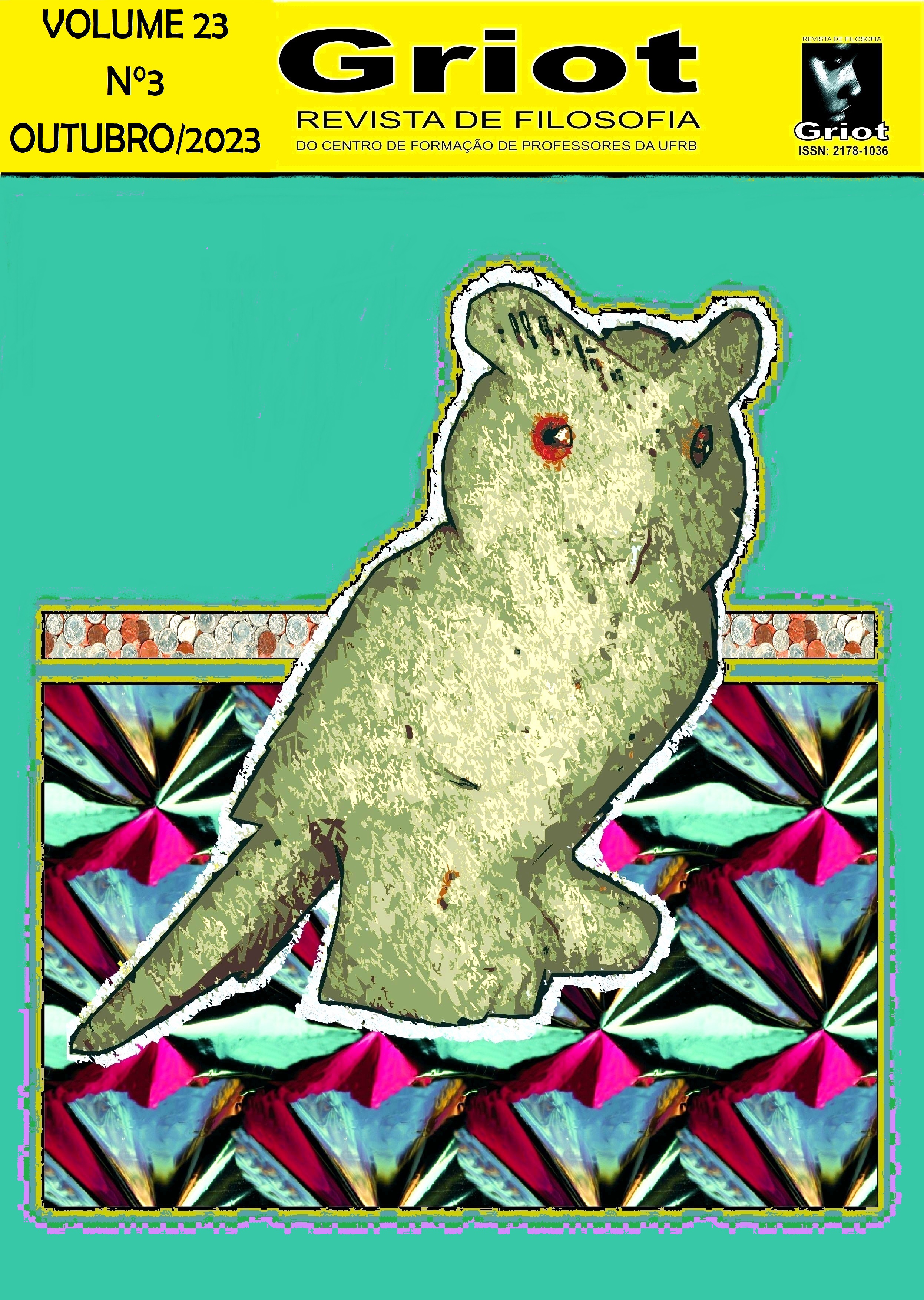Cioran's contributions to antidogmatic thinking
DOI:
https://doi.org/10.31977/grirfi.v23i3.3465Keywords:
Emil Cioran; Antidogmatism; Skepticism.Abstract
The work of Romanian philosopher Emil Cioran presents significant challenges to researchers, due to his non-systematic model of expression and refusal to define clear theoretical horizons. This fact contributes to the difficulty of securely associating him with a specific tradition of thought. This article aims to foster discussion on how, despite significant limitations, Cioran contributed to antidogmatic thinking. To achieve this introductory objective, the study proposes to (a) investigate the changes undergone by the philosopher between his early and mature works; (b) gradually present the antidogmatic characteristics of Cioran's thinking; and (c) identify the idiosyncrasies of this supposed antidogmatism. The underlying hypothesis of this inquiry is that Cioran, through his peculiar antidogmatism, perfected a "method" that allowed him to engage in philosophical discussions while persisting in the self-imposed "task" of proposing nothing. Within this scope, it is considered possible to sufficiently clarify obscure or previously unacknowledged aspects of his work.
Downloads
References
ABBAGNANO, Nicola. Dicionário de Filosofia. Tradução de Alfedro Bosi e Ivone Castilho Benedetti. São Paulo: Martins Fontes, 2007.
ARON, Raymond. Démocratie et Totalitarisme. Paris: Gallimard, 1987 (1965).
BAECHLER, Jean. La grande parenthèse (1914-1991): Essai sur un accident de L'histoire. Paris: Éditions Cairnan-Lévy, 1993.
BENEVIDES, Walter. E.M. Cioran, um pessimista quase perfeito. Rio de Janeiro: Jornal do Commercio. 2 de nov 1968, p. 34. Impresso.
BLAGA, Lucian. Trilogia cunoașterii. Bucareste: Humanitas, 2013.
BRANDÃO, Bernardo G. dos Santos Lins. A tradição do discurso apofático na filosofia grega. Hypnos, São Bento, v. 18, n. 12, p. 90-97, 2007.
CASSIRER, Ernst. A filosofia do Iluminismo. Trad. Álvaro Cabral. São Paulo: UNICAMP, 1997.
CIORAN, Emil. Apologie de la Barbarie. Paris: L’Herne, 2015.
CIORAN, Emil. Breviário de Decomposição. Rio de Janeiro: Rocco, 2011 (1949).
CIORAN, Emil. Cahiers: (1957-1972). Paris: Gallimard, 1997.
CIORAN, Emil. Do inconveniente de ter nascido. Lisboa: Letra Livre, 2010c (1973).
CIORAN, Emil. Écartèlement. In: Œuvres. Paris: Gallimard, 1995a (1979), p. 1407-1504.
CIORAN, Emil. Entretiens. Paris: Gallimard, 1995b.
CIORAN, Emil. Exercices négatifs: En marge du Précis de Décomposition. Paris: Gallimard, 2005.
CIORAN, Emil. Nos cumes do desespero. São Paulo: Editora Hedra, 2012 (1934).
CIORAN, Emil. O Livro das Ilusões. Rio de Janeiro: Rocco, 2014 (1936).
CIORAN, Emil. Recuperare publicistică (II). Caiete Critice, Bucureşti, n. 9, 2010a, p. 19-20.
CIORAN, Emil. Scrisori către cei de-acasă. Bucureşti: Humanitas, 2010b.
CIORAN, Emil. Silogismos da amargura. Rio de Janeiro: Rocco, 2011b (1952).
CIORAN, Emil. Solitude et destin. Paris: Arcades Gallimard, 2004.
CIRACÌ, Fabio. Mainländer, Cioran y el dios perdido. THÉMATA. Revista de Filosofía Nº 61, enero-junio (2020) pp.: 123-135. Traducción de Carlos Darío Romero y Gabriel Adelio Saia.
CONSTÂNCIO, João. On Nietzsche’s Conception of Philosophy Beyond Good and Evil: Reassessing Schopenhauer’s Relevance, In: BORN, Marcus Andreas; PICHLER, Axel. (Orgs.). Texturen des Denkens: Nietzsches Inszenierung der Philosophie in "Jenseits von Gut und Böse". Berlin, Boston: De Gruyter, 2013, pp. 145-164.
HEGEL, Friedrich. Introdução à História da Filosofia. Coimbra: Editora 70, 2006 (1805).
KANT, Immanuel. Prolegómenos a Toda a Metafísica Futura. Coimbra: Editora 70, 2020 (1783).
LEITE JUNIOR, Pedro. O Nominalismo de Guilherme de Ockham: Ontologia e Semântica. Thaumazein, Ano IV, Número 08, Santa Maria (Dezembro de 2011), pp. 29-45.
NIETZSCHE, Friedrich. Humano, demasiado humano II. Trad. Paulo César de Souza. São Paulo. Companhia das Letras. 2008 (1880).
PĂTRAŞCU, Horia. “Revalorizarea Scepticismului În Opera Franceză a Lui E. M. Cioran”. Bucureşti: Rev. filos., LXIV, 3, p. 349–357, Bucureşti, 2017.
PETREU, Marta. An Infamous Past: E.M. Cioran and the Rise of Fascism in Romania. Chicago: Ivan R. Dee, 2005.
PETREU, Marta. Préface. In: CIORAN, Emil. Transfiguration de la Roumanie. Paris: L'Herne, 2009 [1936], p. 12-54.
PRATES, Rui. Cioran e o Ceticismo. Cuadernos de Pesimismo, v. 1, n. 1, p. 164–183, 6 maio 2022.
PRATES, Rui. Transfiguração: um anti-ceticismo metodológico na obra romena de Emil Cioran. UFBA, 2021, 180p.
ROTIROTI, Giovanni. Das Unbehagen In Der Kultur a lui Freud în opera lui Cioran: ecouri disonante și profunde. Bucureşti: Editura Universităţii din Bucureşti, 2020.
ROTIROTI, Giovanni. Il demone della lucidità: Il “caso Cioran” tra psicanalisi e filosofia. Soveria Mannelli: Rubbettino Editore, 2005.
RUSSELL, B. História da filosofia Ocidental. São Paulo (Sp): Companhia Editora Nacional, 1975.
SEXTUS EMPIRICUS. Esbozos Pirrónicos. Tradução: Antonio Gallego Cao; Teresa Muñoz Diego. Madrid: Editorial Gredos, 1993.
SLOTERDIJK, Peter. Cioran ou l'excès de la parole sincere. In: Tacou, Laurence; Piednoir, Vincent (Orgs.). Cahier Cioran. Paris: L'Herne, 2009, p. 232-237.
STIRNER, Max. O único e a sua propriedade. Tradução de João Barrento. São Paulo: Martins Fontes, 2009.
UNAMUNO, Miguel de. Do sentimento trágico da vida. São Paulo: Martins Fontes, 2019 (1912).
VALCĂN, Ciprian. Influencias culturales francesas y alemanas en la obra de Cioran. Universidad Tecnológica de Pereira. Pereira: 2016.
VOLPI, Franco. O Niilismo. São Paulo: Edições Loyola, 1999.
Downloads
Published
How to Cite
Issue
Section
License
Copyright (c) 2023 Rui Prates

This work is licensed under a Creative Commons Attribution 4.0 International License.
The authors who publish in Griot: Revista de Filosofia maintain the copyright and grant the magazine the right of first publication, with the work simultaneously licensed under the Creative Commons Attribution 4.0 International License, allowing sharing and adaptation, even for commercial purposes, with due recognition of authorship and initial publication in this journal. Read more...









































































